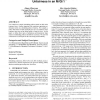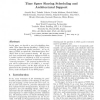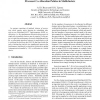43 search results - page 2 / 9 » Unfairness Metrics for Space-Sharing Parallel Job Schedulers |
SIGMETRICS
2003
ACM
13 years 10 months ago
2003
ACM
It is common to evaluate scheduling policies based on their mean response times. Another important, but sometimes opposing, performance metric is a scheduling policy’s fairness....
JSSPP
1995
Springer
13 years 8 months ago
1995
Springer
In this paper, we describe a new job scheduling class, called \Time Space Sharing Scheduling" (TSSS) for dynamically partitionable parallel machines. As an instance of TSSS, ...
EUROPAR
2004
Springer
13 years 10 months ago
2004
Springer
Scheduling parallel jobs has been an active investigation area. The scheduler has to deal with heterogeneous workloads and try to obtain throughputs and response times such that en...
JSSPP
2001
Springer
13 years 9 months ago
2001
Springer
The arrival process of jobs submitted to a parallel system is bursty, leading to fluctuations in the load at many time scales. In particular, rare events of extreme load may occu...
HPDC
2003
IEEE
13 years 10 months ago
2003
IEEE
In systems consisting of multiple clusters of processors which employ space sharing for scheduling jobs, such as our Distributed ASCI1 Supercomputer (DAS), coallocation, i.e., the...



